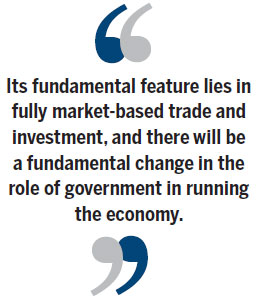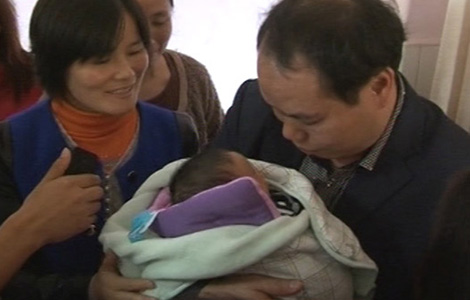Baby steps in the right direction
Updated: 2013-11-08 09:14
By He Weiwen (China Daily Europe)
|
|||||||||||

Shanghai FTZ is an experiment that could lead to significant changes throughout China
In its first month, the Shanghai free trade zone has had an encouraging start, with the business community showing a great deal of interest.
From 5:30 am every working day, there were long queues for business registrations or inquiries outside the administration office, where officials were forced to restrict applications to 200 a day.
By Nov 4, more than 200 new business entities had registered in the zone, including 29 foreign investors. More than 1,500 existing businesses had also registered. Trading companies account for 60 percent of the total, with services companies, including 23 financial institutions, making up 33 percent.
According to the zone's negative list, which bars companies in a range of industries, acceptable businesses could be registered in four working days. Of the list's 23 criteria for the opening-up of the services sector, 12 have been implemented, seven will soon take effect, with the remaining four depending on further details from the central government.
As an important innovative step, the first order for air freight leasing was recently concluded with Bank of Communications.
A distinct feature of the first month's operation of the Shanghai free trade zone was the absence of any signs of financial liberalization, including renminbi convertibility under capital accounts, a fully market-based mechanism for forming a renminbi exchange rate, and a fully market-based mechanism for interest rates. This is considerably different from what many people had expected when the free trade zone was first announced.
However, we should not have any doubts about the zone's intended role in unprecedented reform and opening-up. Rather, we should ask whether those early expectations were practical.
I mentioned in an earlier article that the Shanghai zone was to be first of all a free trade zone, not a free financial zone. Its fundamental feature lies in fully market-based trade and investment and, based on that, there will be a fundamental change in the role of government in running the economy.
The Shanghai free trade zone envisages opening up 18 sectors of the economy, and the financial sector is only one of those. Of course, a free market trade and investment mechanism must have a compatible free market financial system, including a fully convertible sovereign currency and free cross-border capital flows.
However, unlike merchandise trade, which is visible and has relatively obvious borders, and other sectors such as education or medical services which have little spill-over effects, currency convertibility and cross-border capital flows are invisible, borderless and thus must be handled with adequate risk control.
Another difficulty is the fact that there is little existing international experience relevant to China's case. Free trade zones in the United States, Europe and Japan do not have similar problems because their sovereign currencies are already fully convertible. Experiences in other emerging economies, such as the Panama Canal Zone, are also less relevant because of the much greater size of China's economy. As a result, China has to create its own experiences based on strict, scientific experiments. This will take time.
The 2013 edition of the Shanghai free trade zone negative list has been criticized for not being open enough, in that it is merely the opposite of the current positive list.
While this is more or less true, there is still a fundamental difference. The current positive list guiding foreign investment in China is incomplete. The list contains three categories: forbidden, restricted and encouraged. There are many neutral subsectors in the economy that are not forbidden, restricted or encouraged. The positive list does not include them.
As a result, foreign companies planning to invest in those sectors have to go through prolonged inquiries and approval procedures with the government, which cause low efficiency and less transparency. Now, the first two categories fall into the Shanghai zone's negative list (not completely, as there are slight differences), leaving all the others, which form a bigger category than the encouraged sectors, open for free investment. This is a big step forward.
What is more important, a word change from "positive" to "negative" means a fundamental change in the role governments play in business. The former means permissible only if on the list, while the latter means green light for all those not on the list. This will lead to changes in governments' economic roles for the whole Shanghai free trade zone and ultimately the whole country. We should understand the historical significance of this, instead of lingering over some sectors on the negative list.
Of course, the current negative list must be reduced, but through strict, scientific methods. Because of the lack of relevant experience and the size of China's economy, it should be improved only in small, stable steps.
More than a century ago, two scientists finally succeeded in finding a vaccine, which could kill a virus in an animal without harming the creature. They conducted 606 tests with 605 failures. Hence, the new vaccine was named 606. Like all scientific tests which are full of setbacks and difficulties, the Shanghai free trade zone is a huge laboratory for the country's economy. China is set to engage in fundamental new reform and further opening-up. However, because the circumstances are unique, the changes must be solidly based on careful experiments and testing.
Even more significantly, the free trade zone is not for Shanghai alone but for China as a whole. The results and experiences of the zone will ultimately be reproduced across the rest of the country. There is no doubt that all policies applied and measures taken in the zone will have national implications and must be carefully handled.
About three years will be required for the Shanghai free trade zone to accumulate initial results. The month-old infant should walk steadily, without haste but with determination to its final success, thus making historic contributions to the nation's reform and opening-up.
The author is co-director of the China-US/EU Study Center at the China Association of International Trade.
(China Daily European Weekly 11/08/2013 page9)
Today's Top News
SOE reforms to be launched after plenum
'Singles Day' to see big spenders
Launch zone challenges
European satellite continues fall to Earth
CPC session begins to set reform agenda
Economic growth to continue
Super typhoon kills over 10,000
World powers, Iran to hold news nuclear talks
Hot Topics
Lunar probe , China growth forecasts, Emission rules get tougher, China seen through 'colored lens', International board,
Editor's Picks

|

|

|

|

|

|





